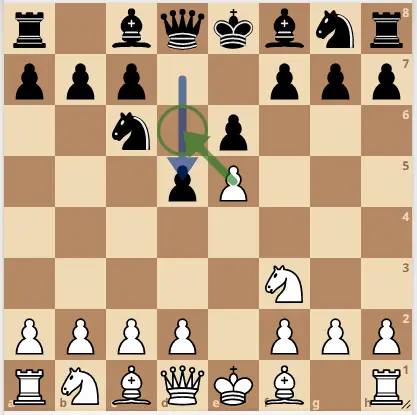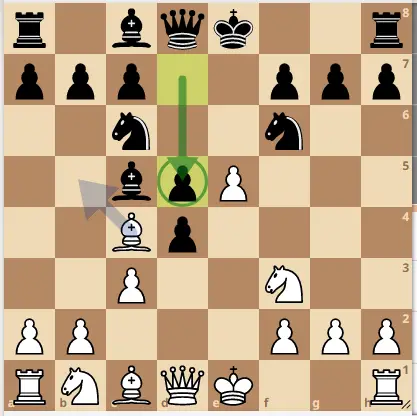En passant is a special move in chess that prevents a pawn from evading capture. It was introduced to chess in 1561 and officially got accepted into the rule books in 1880.
According to article 3.7 d of the FIDE laws of chess, “A pawn attacking a square crossed by an opponent’s pawn which has advanced two squares in one move from its original square may capture this opponent’s pawn as though the latter had been moved only one square”. This move is known as en passant.
En passant in chess

If you’re just getting introduced to the concept of en passant, you may be asking yourself, “Is en passant forced?” In this article, we will discuss if this strange looking move en passant is mandatory in the game of chess. So stick around to find out the answer!
Is En Passant Forced?
En passant is NOT a forced move in chess. If your opponent advances his pawn 2 squares forward and lands it beside your pawn, you are not obligated to capture it. You can decline en passant by simply playing another move over the board.
However, you can no longer capture this pawn via en passant once you’ve made another move. En passant can only be done immediately following the advance.
In the position below, black just played the move pawn to d5. White can now capture this pawn by playing exd6 e.p (en passant), but he is not forced to do it.
White doesn’t have to en passant

Why Isn’t En Passant Forced?
En passant was introduced to the game of chess to prevent a pawn from bypassing capture and to stop the position from locking up.
En passant helps to open up lines for your pieces, thereby preventing the position from getting closed up. Games that are closed will often result in a draw as there is not much progress to be made when the center is locked.
However, not all the time it’s good to en passant over the board. If you have not yet castled your king, it would be dangerous to en passant in the center of the board as that could open up lines against your king.
Therefore, en passant was made optional to give players the choice on whether they should open up the position or keep it closed. This keeps the balance in the game and makes it fair for both players.
You could en passant and open the e-file along where your king sits. Your opponent can attack your king down the e-file using his heavy pieces such as the rook and queen.
En passant may also be more beneficial to your opponent. For example, it could help him activate and develop his pieces which he could not have done otherwise.
In the position below, black just played the move pawn to d5 in the well known Italian Opening. It would be a mistake for white to capture this pawn via en passant as that would release the tension in the center and open up more lines for black’s pieces.
White should keep the tension in the center by playing the move Bishop to b5.

All in all, en passant is not always a good move to make and that’s why it should not be forced.
Touch Move Rule May Force En Passant
Though en passant is not a forced move in chess, there are some exceptions. One such exception is the touch move rule. The touch move rule makes clear that if you touch a piece, you should move it according to the FIDE rules of chess.
Therefore, if you touch your pawn and the only move it can make is en passant, then you must play that move. However, if you can play another move with that same pawn, then en passant is not forced as you have other options which may involve advancing your pawn forward or capturing another piece.
To avoid being forced to make a move like en passant, you should say “I adjust” before touching the pawn on the board. Or you could say “J’adoube” (french word for I adjust).
For more information on the touch move rule, see article: Why does the touch move rule exist?
What Moves In Chess Are Forced?
The main goal of chess is to checkmate the enemy king while also preventing your own king from getting checkmate. Therefore, it is illegal to expose your king to an attack or move it to an endangered square.
This means that you are forced to protect your king at all times in the event it gets checked by your opponent’s piece.
For example, if your king is placed in check by your opponent’s bishop, you are forced to eliminate this threat by capturing the piece delivering check, block the check using one of your pieces, or move your king away from the check.
White is forced to block the check delivered by black’s bishop

Here white has many options. He can block the check with either knights, bishop or even the queen. However, blocking the check with the queen would be a very bad move as it would be captured by the bishop.
When Are You Not Allowed To En Passant?
En passant only occurs on the move immediately following the advance. You won’t be given the opportunity to en passant again if you play another move. Therefore, you should strongly consider whether you want to en passant or not.
Nevertheless, there are other events where you are not allowed to en passant over the board. For example, if one of your opponent’s piece is pinning the pawn to your king, then you cannot remove the pawn from the defense of the king.
In the position below, the black queen on the e-file is pinning white’s e5 pawn to the king. Though black advanced his d pawn 2 squares forward, white’s e5 pawn cannot capture black’s d5 pawn via en passant. This would be an illegal move as this would expose the white king to the black queen on e7.

Final Vedict
En passant is an optional move in chess. It is not forced unless you touch the pawn according to the touch move rule. Still, you don’t have to en passant if you can make another move with that pawn.
En passant is one of the last moves introduced to chess which helped the game to become more complete and refined. The benefits to having this move is to prevent the position from locking up and stop the enemy pawn from evading capture.
Related Post: Is En Passant Legal?


